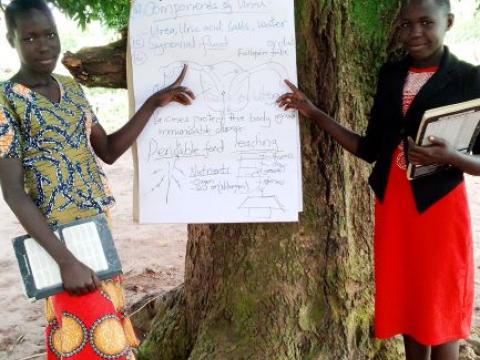Despite current circumstances, the future is bright for children in Soroti

By Nanyanzi Caroline
When schools were closed in March, 15 million children in Uganda were affected. Students had hopes that it would be a short break. However, with the rising cases of COVID-19, these students found themselves adjusting to studying at home.
One of these students is Olivia. She is in primary seven at Kamuda primary school and is supposed to sit for her final exams to graduate to high school. “I have been at home for four months, I miss my school and teachers. I don’t even know what will happen if schools don’t open again,” Olivia explains.
Following the lockdown, the Ministry of Education and Sports created learning programmes which are distributed on radio, television and newspaper among others. These radio classes helped Olivia to continue her learning. “I sometimes followed the radio teachings on Etop radio, a local radio station in Soroti. But because we did not have money for batteries, we had to use the radio only for news,” she says.
As a finalist, Olivia craved a more intensive learning programme. When teachers began homeschooling, she felt like her hope was restored. “I was invited to join a homeschooling group of five children where we share and learn using past papers,” Olivia says.
With the planned sets of past papers for revision, the children take time to do self-study and hand in their work for the teacher's feedback. “Our science teacher Mr Oumo and three others give us past papers. We copy the questions in our books, answer them and hand in for marking,” she explains. “We meet on another day and correct the work with their guidance,” she adds.
World Vision is supporting teachers to reach their students in their households. Students living in close proximity from each other meet in small groups at one household where a teacher conducts classes. Through transport facilitation from World Vision, teachers can move to various households and take homeschool groups through their classes. All households with study centres have a tippy tap for children to wash their hands regularly and during the revision of work. Their teacher also wears a mask to protect the children in case of an infection.
One of the best things about the classes is that children meet with their teachers regularly. “We played and tried to be busy but we got tired of that. We like seeing our teachers and working as if we are in class,” they explain.
These classes have also occupied the students. “Children have been loitering a lot, we were already getting worried about their safety since many look wild and stressed due to the current situation in the country,” says Mr Okiror, a science teacher.
“This has never happened in the history of our generation but we are thankful to the Soroti District education team and World Vision for enabling homeschooling to happen at household level, especially for primary seven pupils. We hope this spreads out to other classes too,” he adds.
As the students ponder on what their future holds, these homeschooling classes have given finalists like Olivia hope and a peace of mind.